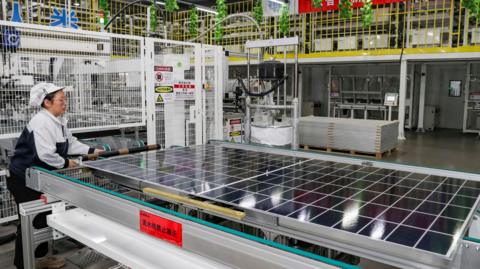In recent years, many Chinese firms have moved operations to South East Asia in a bid to avoid tariffs imposed since the start of US President Donald Trump's first term.
The US Commerce Department's findings were welcomed by the American Alliance for Solar Manufacturing Trade Committee - a group of manufacturers that called on the US government to launch the investigation.
"This is a decisive victory for American manufacturing and confirms what we've long known: that Chinese-headquartered solar companies have been cheating the system," said Tim Brightbill, lead counsel to the Alliance.
In 2023, America imported almost $12bn (£8.9bn) in solar equipment from the four countries, according to US Census Bureau figures.
While the planned tariffs are likely to help US solar panel manufacturers, they could also mean extra costs for businesses and consumers who have benefited from the availability of cheaper solar products.
The levies would be imposed on top of other tariffs already rolled out by the Trump administration.
The planned tariffs were announced just days after Chinese President Xi Jinping completed a tour of Vietnam, Malaysia and Cambodia.
The trip was aimed to boost ties with the region and encourage those nations to resist what he called "unilateral bullying" by the US.
Trump has so far imposed taxes of up to 145% on imports from China. Other countries are now facing a blanket US tariff of 10% until July.
His administration said last week that when the new tariffs are added on to existing ones, the levies on some Chinese goods could reach 245%.
China has hit back with a 125% tax on products from the US and vowed to "fight to the end".
